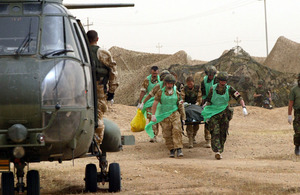Improved Armed Forces Compensation Scheme comes into effect
The revised Armed Forces Compensation Scheme (AFCS) has been launched today, incorporating all of the recommendations made by Admiral the Lord Boyce, former Chief of the Defence Staff, in his review of the scheme in 2010.

An injured Service person being medically evacuated by air from theatre [Picture: Crown Copyright/MOD 2008]
Service personnel who become injured or ill as a result of their service will now be able to benefit from a more comprehensive compensation package, including an increase, on average in excess of 25 per cent, to all lump sum payments, except the top award which was recently doubled to £570,000.
The maximum award payable for mental illness has also increased from £48,875 to £140,000 in order to accurately reflect the impact of the most serious mental health conditions.
There has also been an increase to all Guaranteed Income Payments, a tax-free monthly income stream which is paid to those who are seriously injured, for life. The increase reflects the lasting effect of more serious injuries on future promotion prospects and on the ability to work to age 65.
Minister for Defence Personnel, Welfare and Veterans, Andrew Robathan, said:
I am grateful for the recommendations made in Admiral the Lord Boyce’s Review of the Armed Forces Compensation Scheme last year. While the review found that the scheme was fundamentally sound, it made a number of recommendations for improvement - all of which will be implemented today.
We must do all we can for those who become injured or ill in service and ensure the care and support we give them is the best possible. This package of changes will result in a significant financial uplift for injured military personnel and clearly demonstrates our commitment to helping our wounded men and women for the rest of their lives.
All those who have previously received an award from the scheme (since its inception on 6 April 2005) will have their awards uplifted in line with the new increases. Over the course of the next year the Service Personnel and Veterans Agency will be reviewing around 10,000 awards and informing previous recipients of the increases that they will receive.
The Boyce Review also recommended further, detailed examination of a number of types of injury and illness to ensure the AFCS was providing fair compensation in all cases. As a result of this, an Independent Medical Expert Group (IMEG) was set up and has produced a report which makes a number of recommendations. All of those relating to compensation have been implemented in the revised scheme.
One of the key recommendations made by the IMEG is that those who become infertile as a result of service are provided with a number of free cycles of IVF treatment. Given the complexity involved in delivering the recommendation regarding provision of IVF treatment, this is an issue we will continue to work on in conjunction with colleagues in the four health departments in England, Wales, Scotland and Northern Ireland.